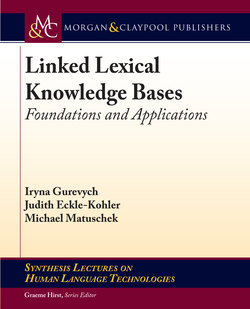Читать книгу Linked Lexical Knowledge Bases - Iryna Gurevych - Страница 7
На сайте Литреса книга снята с продажи.
ОглавлениеContents
Foreword
Preface
Acknowledgments
1 Lexical Knowledge Bases
1.1 Expert-built Lexical Knowledge Bases
1.1.1 Wordnets
1.1.2 Framenets
1.1.3 Valency Lexicons
1.1.4 Verbnets
1.2 Collaboratively Constructed Knowledge Bases
1.2.1 Wikipedia
1.2.2 Wiktionary
1.2.3 OmegaWiki
1.3 Standards
1.3.1 ISO Lexical Markup Framework
1.3.2 Semantic Web Standards
1.4 Chapter Conclusion
2 Linked Lexical Knowledge Bases
2.1 Combining LKBs for Specific Tasks
2.2 Large-scale LLKBs
2.3 Automatic Linking Involving Wordnets
2.4 Manual and Collaborative Linking
2.5 Chapter Conclusion
3 Linking Algorithms
3.1 Information Integration
3.1.1 Ontology Matching
3.1.2 Database Schema Matching
3.1.3 Graph Matching
3.2 Evaluation Metrics for WSL
3.3 Gloss Similarity-based WSL
3.3.1 Word Overlap
3.3.2 Vector Representations
3.3.3 Personalized PageRank
3.3.4 Additional Remarks
3.4 Graph Structure-based WSL
3.4.1 Wikipedia Category Alignment
3.4.2 Shortest Paths
3.5 Joint Modeling
3.5.1 Machine Learning Approaches
3.5.2 Unsupervised Approaches
3.6 Chapter Conclusion
4 Fundamental Disambiguation Methods
4.1 Disambiguating Textual Units
4.2 Enhanced Disambiguation Using LLKBs
4.2.1 Approaches
4.2.2 Overview of Work in this Area
4.3 Robust Disambiguation Heuristics
4.4 Sense Clustering
4.4.1 Method
4.4.2 Overview of Work in this Area
4.5 Sense-annotated Corpora
4.6 Chapter Conclusion
5 Advanced Disambiguation Methods
5.1 Automatic Knowledge Base Construction
5.2 Distant Supervision
5.2.1 Method
5.2.2 Overview of Work in this Area
5.3 Continuous Vector Space Models of KBs
5.3.1 Method
5.3.2 Overview of Work in this Area
5.4 Chapter Conclusion
6 Multilingual Applications
6.1 Multilingual Semantic Relatedness
6.2 Computer-aided Translation
6.2.1 Overview of Work in this Area
6.2.2 Illustrative Example
6.3 Chapter Conclusion
7 Interfaces and Tools
7.1 Exploration Interfaces
7.2 Curation Interfaces
7.3 Resource API’s for Text Processing
7.4 Chapter Conclusion
8 Conclusion and Outlook
8.1 Summary
8.2 Outlook
Acronyms
Bibliography
Authors’ Biographies
